With foreign troops set to leave Afghanistan and aid organizations scaling back operations, UN Women Chief Phumzile Mlambo-Ngcuka warns of the negative impact the pullout may have on policy gains made by Afghan women.
Despite a myriad of challenges facing Afghanistan, remarkable gains have been made on women's rights over the past 13 years. Since the US-led invasion of the country in 2001, women have won back many of the rights they lost during the Taliban regime. Equality between men and women is mandated in the country's constitution. The number of girls getting an education is rising and women are part of the National Assembly.
The Afghan government has also been hailed for making strides to protect human and civil rights, such as the signing of the Convention on the Elimination of All Forms of Discrimination Against Women (CEDAW) and the enactment of its own law on the Elimination of Violence Against Women (EVAW) in 2009. However, there have been complaints about the slow implementation of these laws and violence remains a reality for many women and girls.
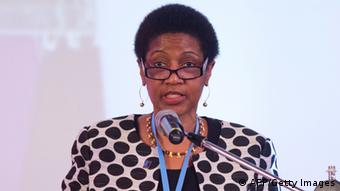
Mlambo-Ngcuka: The real challenge lies in the consistent implementation of the laws designed to protect women
Phumzile Mlambo-Ngcuka, the executive director of UN Women, says in a DW interview she is seriously concerned that the upcoming transition will have a strong negative impact on the fragile policy gains made by Afghan women in the past 10 years. The UN official argues that overall political instability, the reduction of aid inflows, and a readiness to make compromises in the interest of ongoing peace and reconciliation negotiations with the Taliban may endanger these gains.
DW: What situation are women in Afghanistan facing at the moment?
Mlambo-Ngcuka:Afghan women and girls continue to experience discrimination and limited access to opportunities, resources, civil liberties and power. There are two main causes that drive this development: Firstly, Afghan society is rooted in tribal structures, ethnic cultures, and traditions. This remains the primary cause of gender inequalities. Conservative traditions, customary practices, and religious interpretations are collectively impeding realization of women's human rights.
Secondly, limited institutional capacities to deliver have hindered full implementation of policy and legislation aimed at gender equality and empowerment of women. Within government, there is currently insufficient capacity to translate policies into projects and services that would improve conditions.This affects gender equality policies as well as many other sectors, including education, health, trade, labor, and the economy. In some instances, funds and opportunities have not been used to their full extent.
Moreover, a strong relationship exists between discriminatory social institutions and overall development. All in all, the underlying concerns for women include: (i) Low participation in politics and governance; (ii) Continued and increasing insecurity and limited access to justice; (iii) Pervasive violence against women; (iv) limited participation in peace and reconciliation processes; (v) poor access to health services; (vi) limited economic security; and (vii) inadequate access to education and high female adult illiteracy.
Addressing these needs for the female population would have significant positive effects on the growth and sustainability of the national economy.
What progress have women in Afghanistan made over the past 13 years?
There has been gradual progress, with the enactment of the Elimination of Violence Against Women (EVAW) Law being perhaps the greatest achievement. This law codifies what constitutes violence against women and creates a legal framework for prosecution. It has also focused dialogue on women's rights.
It is noteworthy that space for such dialogue between civil society and government remains open to all. Other legal reforms include the gazetting of the revised Criminal Procedure Code, which has been engendered and more strongly reflects international standards on gender-based-violence-related crimes as well as protection of the rights of men and women.
The real challenge, however, lies in the consistent implementation of these laws, especially EVAW. There remains significant work to be done on ensuring equal and transparent application of the law, moving away from the current dependency on mediation and traditional conflict resolution mechanisms.
Politically, 27.5 percent of the National Assembly members are women, giving Afghanistan a rank of 36 out of 190 countries globally. Of the 420 seats in the Provincial Councils, 20 percent are reserved for women; a reduction of 5 percent as a result of recent revision of the election law.
Moreover, about 30,000 women have an increased formal voice at local level in community councils; one woman has been appointed governor and one as mayor. However, women are under-represented in cabinet, advisory and diplomatic posts. In this year's presidential and provincial council elections, an estimated 37 percent of the voters were women.
However, although women have achieved some representation in parliament, they do not yet have significant influence in the political arena. Women elected on reserved seats are largely considered to lack constituency-based legitimacy and political authority.
After the 2010 elections, only 3 women attained cabinet ministerial positions (12 percent) and only five are deputy ministers (7 percent). The new government has promised an increased number of women in high decision-making positions; the Cabinet has not yet been finalized.
Does violence against women remain endemic in the country?
The Ministry of Women's Affairs reports that over 4000 cases of violence against women were registered last year. However, this number underestimates the real scope of the issue, which is widespread, and reflects a lack of education, insufficient access to basic services and economic opportunities, and the few opportunities women have to participate in all aspects of social and political life.
Husbands are not the sole perpetrators of violence against women in the home: mothers-in-law, sisters- and brothers-in law, as well as other male family members have also been identified as abusers by studies conducted on violence against women in the country. Direct abuse, condoning violence and encouragement of sons to beat their wives is reported as common.
This is not to understate the high prevalence of violence by non-family members and the effects of 30 years of conflict during which rape and gender-based violence was used as a weapon and hidden behind a legacy of impunity. It is therefore important to address legal aspects as well as the prevention and protection aspects of violence against women, through engagement of all stakeholders, with particular emphasis on men, boys and local leadership - religious, political, cultural and social.
Events such as the recent rape of a three-year-old girl remind us forcefully of the difficulties of families to bring perpetrators to justice and of the trauma they face as they cope not only with the attack but the stigma that follows. Violence against women is a symptom of deeper social and development issues; if no attention is paid to the root causes, this type of violence will not diminish.
Has the Elimination of Violence Against Women law failed to achieve its goal?
Although controversial, the EVAW Law has raised the profile of the gender agenda in Afghanistan, providing a platform for debate and awareness raising on issues related to gender equality and the rights of women and girls particularly, to live a life free of violence. The law itself has not failed, but the irregular and weak implementation of the law means that women still cannot claim justice, and many perpetrators of violence go free.
Studies confirm that the level of violence against women in Afghanistan is exceptionally high – up to 87.2 percent of women have experienced some form of violence. Different forms of violence are prevalent in the country: physical violence, psychological violence, economic violence, social abuse, sexual violence and rape, forced marriage, early marriage and dowry (walwar, pashcash).
Some practices (ba'ad and badaal) include families selling their often pre-pubescent daughters to older men, either as a way to boost family income and reduce mouths to feed at home, as a way to reduce (family) disputes or, in some areas of Afghanistan - South and Eastern parts - as "blood money" for intentional murder.
Are you concerned that some of the gains made by women during the past 13 years may be jeopardized once foreign troops leave the country?
Afghanistan will assume full responsibility for security by end-2014, most international military forces will be withdrawn, and overall assistance will be reduced. These changes will have a profound impact on Afghanistan's economic and political landscape beyond 2014.
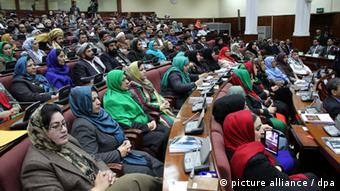
Although women have achieved some representation in parliament, they do not yet have significant influence in the political arena, says the UN Women chief
I am seriously concerned that the transition will have a strong negative impact on the fragile policy gains made by Afghan women in the past 10 years. Should the outcome be violence and protracted internal insurgency, this will be extremely damaging to development. International experience indicates that political stability and consolidation are key ingredients for peaceful development.
Afghan state-building processes must take gender equality into account. Insecure environments often lead to increased gender-based violence and undermine development efforts. Similarly, security programs must take into account the different roles of men and women in society, to avoid the risk of being unsustainable over the long‐term.
There has been forceful rhetoric around women's rights from both national and international actors since the international intervention in 2001. This has made an important contribution over the past decade to reversing some of the injustices and human rights abuses perpetrated under the Taliban regime. Nonetheless, overall, the actions taken to improve the situation of Afghan women have not matched the rhetoric.
The gains for Afghan women made in the past decade could be endangered by overall political instability, the reduction of aid inflows, and a readiness by both international and national sides to make compromises in the interest of ongoing peace and reconciliation negotiations with the Taliban.
What must the new Afghan government and the international community do to improve the lives of women and truly strengthen their rights?
The gender equality and women's empowerment agenda needs to remain a human development agenda, rather than a political one, in order for Afghanistan to truly develop its full potential. UN Women strongly calls for women's rights never to be used as a bargaining tool in future negotiations with the Taliban.
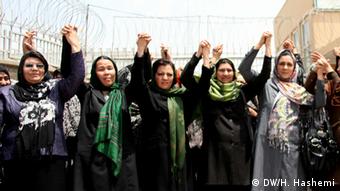
The gains made in the past decade could be endangered by overall political instability or the reduction of aid inflows, says Mlambo-Ngcuka
UN Women strongly advocates for an enhanced partnership between government and civil society in order to achieve sustainable progress. The international community cannot be solely responsible for raising red flags and negotiating change – this must come from civil society as well.
The international community, in the light of the shifting environment and potential decline of resources, must also work closely with government and civil society to identify durable Afghan-led solutions, with strategic plans for phasing down of external support. There also needs to be recognition of the fact that social change of this magnitude takes time - generations in fact – and withdrawing support too quickly might undermine the directional change started over the past 12 years.
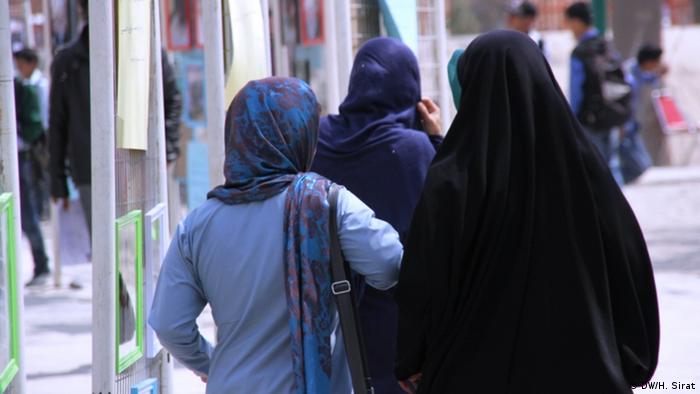
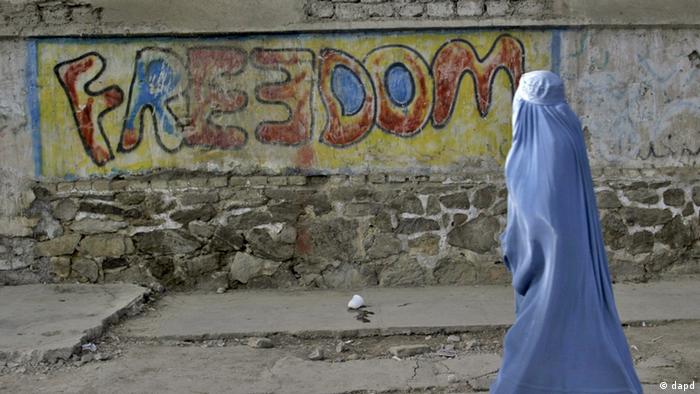
No comments:
Post a Comment